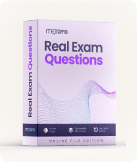Test Prep CPA Auditing and Attestation - Auditing and Attestation Exam
Page: 2 / 205
Total 1025 questions
Question #6 (Topic: Volume A)
In the first audit of a new client, an auditor was able to extend auditing procedures to gather sufficient evidence about consistency. Under these circumstances, the
auditor should:
auditor should:
A. Not report on the client's income statement.
B. Not refer to consistency in the auditor's report.
C. State that the consistency standard does not apply.
D. State that the accounting principles have been applied consistently.
Answer: B
Question #7 (Topic: Volume A)
The third general standard states that due care is to be exercised in the performance of an audit. This standard is ordinarily interpreted to require:
A. Thorough review of the existing safeguards over access to assets and records.
B. Limited review of the indications of employee fraud and illegal acts.
C. Objective review of the adequacy of the technical training and proficiency of firm personnel.
D. Critical review of the judgment exercised at every level of supervision.
Answer: D
Question #8 (Topic: Volume A)
The concept of materiality would be least important to an auditor when considering the:
A. Adequacy of disclosure of a client's illegal act.
B. Discovery of weaknesses in a client's internal control.
C. Effects of a direct financial interest in the client on the CPA's independence.
D. Decision whether to use positive or negative confirmations of accounts receivable.
Answer: C
Question #9 (Topic: Volume A)
An auditor of a nonpublic company must conduct the audit in accordance with:
I. ASB standards.
II. PCAOB standards.
I. ASB standards.
II. PCAOB standards.
A. I.
B. Both I and II.
C. Either I or II, but not both.
D. II.
Answer: A
Question #10 (Topic: Volume A)
Because of the risk of material misstatement, an audit of financial statements in accordance with generally accepted auditing standards should be planned and
performed with an attitude of:
performed with an attitude of:
A. Objective judgment.
B. Independent integrity.
C. Professional skepticism.
D. Impartial conservatism.
Answer: C
